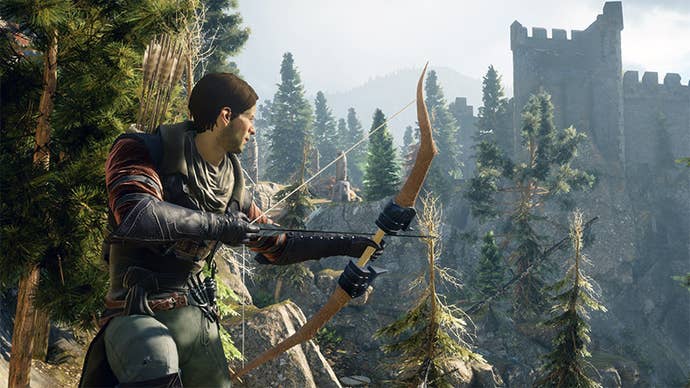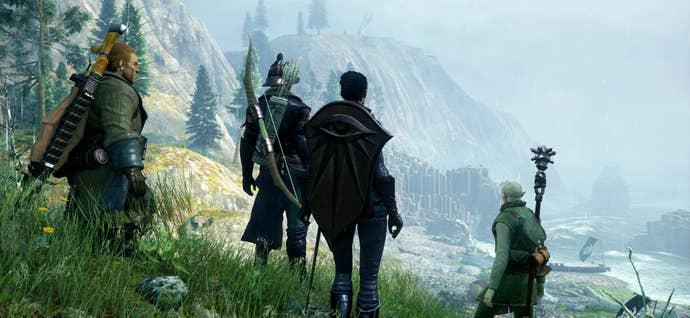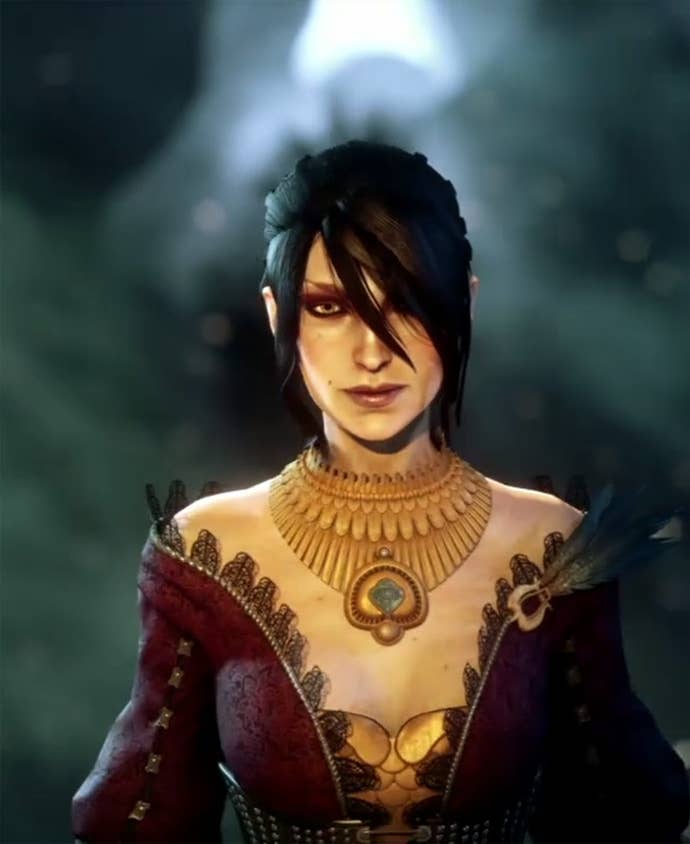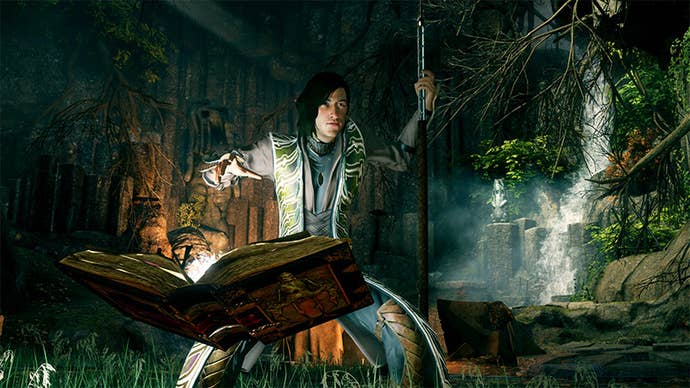Dragon Age: Inquisition PS4 Review: Sealing the Rift
BioWare's best RPG in years.
This article first appeared on USgamer, a partner publication of VG247. Some content, such as this article, has been migrated to VG247 for posterity after USgamer's closure - but it has not been edited or further vetted by the VG247 team.
Note: This review was conducted without the benefit of Dragon Age Keep, which was not available at the time. You can read more about the feature here.
It's hard to say exactly when it began, but BioWare—once the gold standard for western-developed RPGs—has seen its star fade among roleplaying enthusiasts over the years.
Where once their projects were greeted with near universal excitement, the anticipation for Dragon Age: Inquisition has been mixed with a healthy dose of skepticism. Our own Bob Mackey argued that BioWare was now effectively an action developer when he previewed Inquisition just last month. The sense I get is that people feel as if BioWare has forgotten how to make a strong RPG.

Thankfully, Dragon Age: Inquisition puts most of those fears to rest. In the wake of the the rushed and frankly poor Dragon Age II, BioWare has taken their time with Inqusition, and the effort shows. Dragon Age: Inquisition is a long, satisfying adventure that only occasionally finds itself meandering, with a story that manages to catch fire about a quarter of the way into the game.
Admittedly, I wasn't sure how I felt about Inquisition at first. Its begins on a confusing note as the player protagonist alternately referred to as The Herald of Andraste and The Inquisitor—Dragon Age II's Hawke is a bit player in Inquisition—emerges from the supernatural realm known as The Fade and finds herself or himself heading up a nascent organization known as The Inquisition (no relation to the bloody religious persecution of the 15th century). The jumbled, confusing introduction soon gives away to a pleasant loop of exploration and character development as the Inquistor and their party shuttle back and forth between their main base and the various regions around Ferelden and Orlais.
The cast constitutes a smattering of newcomers and familiar faces from both Dragon Age: Origins and Dragon Age: Inquisition. Of them, the acid-tongued Vivienne and perpetual wild card Morrigan stand out as being particularly strong, with Dorian's mustache practically deserving its own skill tree. The rest are defined primarily by some overriding trait, whether it's being foul-mouthed and cynical (Varric) or outright silly (Sera, who is admittedly pretty fun to have in the party with Vivienne). It's admittedly not the strongest cast BioWare has ever assembled, but nor is anyone Ashley-level grating. I expect everyone will find someone to like in this group
Dragon Age: Inquisition's main conceit is that you're building up an organization from nothing to combat a villain's attempt to earn godhood; and believe it or not, it actually works. Though it doesn't always do a great job of showing the results of your various decisions—many of the Inquisition's various operations are referred to only in the abstract—there's still a sense of everything slowly coming together as the game progresses. With each passing mission, the Inquisition's base becomes livelier, the missions more ambitious, and the possibilities greater.
It's most evident in the exploration—by far Dragon Age's strongest point. Though not a "true" open world in the sense that the various regions are cordoned off and accessible only by map, each region feels wild and distinct, not to mention gorgeous. When you arrive in an area for the first time, the map is mostly black, with only a handful of landmarks scattered over the hidden areas to serve as a guide as to where you go. As you move, you establish base camps that act a bit like checkpoints—places where you can heal your party and replenish your potions, which are ideal jumping off points for major forays into enemy territory. In some ways, it feels a bit like you're taming the wilderness while slowly building up the Inquisition.
The bulk of the game is spent riding through these areas, establishing camps, and taking on whatever sidequests you find, with most regions containing at least one major optional dungeon to complete. I especially enjoyed one region where I battled enemy Red Templar from camp to camp, finally pushing them back to their main fortress, which you can then claim for the Inquisition—a long-running battle that did much to drive home the feeling that I was in fact at war. The sense of exploration and adventure is further accentuated by the decision to dramatically limit healing magic in order to make you rely on replenishable potions, which frequently forces you to decide whether to press ahead or return to base to heal up and continue onward.
The other side of Dragon Age: Inquistion's exploration is Power—a pool of points primarily used to open up new areas and story quests, which are earned by establishing camps, closing extradimensional rifts using the Inquisitor's special power, and completing sidequests. Bob and I discussed Power at some length over the course of our Review-in-Progress, and well, I'm still not sure how I feel about it. At best, it's a rather inelegant means of gating progress that still mostly works, mainly because it's often more fun to wander through the wilderness completing various quests, which build up Power quickly.

If you don't mind me saying though, I think the best RPGs handle that sort of thing organically. I don't necessarily like feeling as if I'm being forced to play a lot of side content, even if in reality I don't mind that side content at all. I'm not the sort of person to critical path an RPG, but neither am I a completionist. I like to take things at my own pace and move on when I'm ready. By locking story missions behind sizable Power requirements (up to 40 points are required for one of them), Dragon Age makes me feel like I have to grind points, which is not a feeling I like to have in an RPG. I don't mind grinding, but I like doing it of my volition, not because the story demands it.
At the end of the day though, the Power requirements aren't as huge a deal as they first seem because there's just so much to do. Whenever I feel like I'm running out of content in Inquisition, I just go to the War Room map and unlock a new region, which inevitably provides me a solid Power boost. Apart from that, there's mining materials for crafting, War Room missions that can be assigned to NPCs, and that old BioWare staple, relationships. Occasionally I would have to ride out to close a handful of rifts in order to build up the points necessary to move on, but I was never wanting for something else to do instead if I didn't feel like grinding Power.

As the story progresses, Dragon Age steadily raises the stakes, kicking things into high gear after a major battle that sees the Inquisitor and her forces move into Skyhold—a massive, derelict castle that serves as the Inquisitor's version of the Normandy. The story missions that follow are a real treat, most notably an Orlesian ball heavy with royal intrigue and a Helms Deep-style setpiece battle that brings in elements of both Dragon Age: Origins and Dragon Age II. The kicker is the moment following each story mission when you get to play Daenerys and judge defeated foes from your customizable throne, either sentencing them to death or sentencing them to some other, more insidious punishment. They're small moments in the grand scheme of things, but they add to Dragon Age: Inquisition excellence.
Of course, after all the talk of Dragon Age's exploration, I've yet to cover the element that is likely on everyone's mind—the combat. To that I will say that if you're hoping for an RPG that takes BioWare back to the days of Baldur's Gate, you're apt to be disappointed. I will also say, however, that the combat steadily improves as the adventure progresses, and isn't quite as shallow as it first appears.
As in the previous game, you control a party of four characters consisting of Mages, Rogues, and Warriors. Each class has multiple skill trees—Warriors can fight two-handed or focus on tanking, for example—as well as character-specific specializations. When in combat, the CPU handles the other three party members the majority of the time while you focus on whatever role you've chosen. It is possible to pause the game for a moment and manually issue orders to the entire party before resuming; but as the game went on, I found myself entering the tactics screen less and less. I'll confess that there's an element of button-mashing to some of the battles, but against bosses in particular, it's always best to time out cooldowns and keep the best attacks in reserve since trying to brute force the battle will most likely get you killed.

There's no question that Dragon Age is shallower than many other RPGs; but in the end, it does just enough to keep things interesting. The crafting in particular is excellent—a system in which up to four different materials can be used to augment an item's stats, after which it can be empowered by runes and buffed by special hilts. Almost despite myself, I found myself hunting around for materials that could be used to build new and better armor, which resulted in me spending a great deal of time in the Undercroft. And while it's not too hard to fill up a couple skill trees by the late game, the choices definitely get harder as time goes on and you have to balance the needs of your party with individual empowerment.
As with the rest of Dragon Age: Inquisition, the combat has steadily grown on me with time. There's a lot going on in this game—from the crafting to the exploration to the notion of "Influence" points that confer various combat and conversational bonuses—and it all could have been a real mess in the hands of less skillful designers. But BioWare clearly had a strong guiding vision for Dragon Age: Inquisition, and they've executed on it remarkably well.
It's a nice comeback for BioWare, who have struggled to reclaim their identity in the years since being acquired by Electronic Arts. It took them a while, but they've finally managed to nail the epic fantasy RPG they've wanted to make since Dragon Age: Origins, and the result is one of this year's best games.
VisualsDragon Age: Inquisition has some of the best-looking wilderness I've ever seen. Forests are lush and vibrant and a pleasure to behold, marred only by the occasional visual glitch that is more or less unavoidable in an open-world game of this size.
SoundCharacter discussions consist of the typically snappy BioWare banter. The soundtrack is relaxing, though not especially memorable, relying mostly on riffs appropriate to epic fantasy.
InterfaceThe mechanics are smooth and easy to use, but the War Room table really needs a filter or something to sort between the miscellaneous missions and those pertinent to the story.
Lasting AppealDragon Age: Inquisition is a massive game that can easily last you north of 100 hours between the single-player and multiplayer. A basic run through the story will take between 40 and 50 hours.
ConclusionDragon Age: Inquisition is a graphical showcase for the next-generation consoles—a sprawling, beautiful open-world RPG with a deeply satisfying exploration loop and just enough in the way of mechanical depth to keep hardcore adventurers happy. At more than 50 hours for a single run through the story, it packs in a tremendous amount of content across a wide number of locations. After stumbling a bit of their past few releases, BioWare has recovered to deliver a truly excellent piece of epic fantasy.

